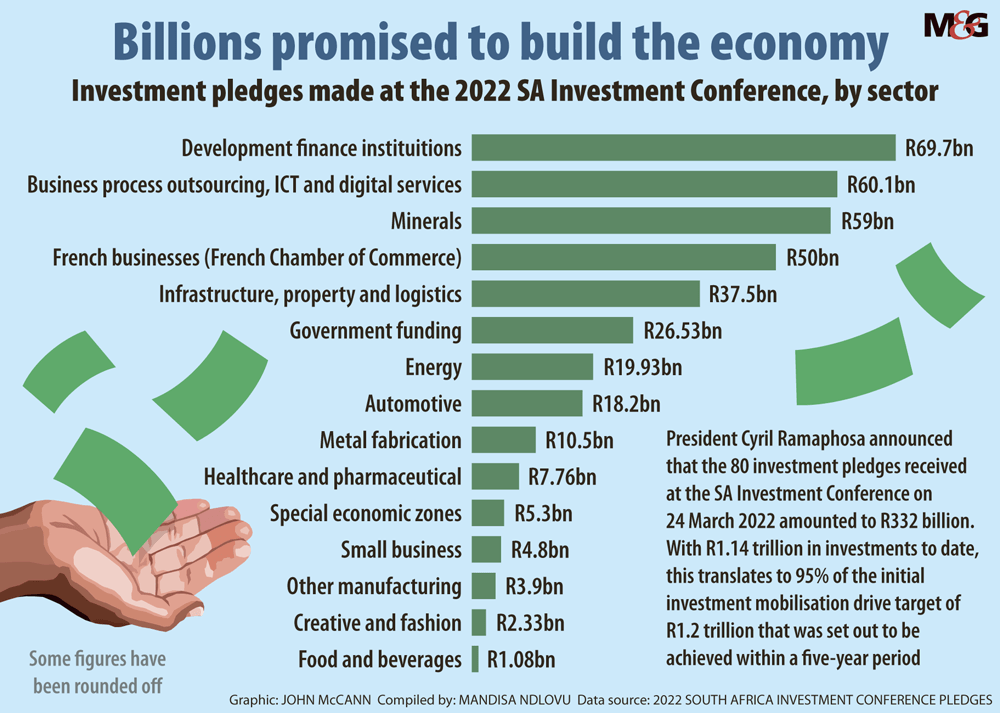President Cyril Ramaphosa. (Photo: David Harrison)
President Cyril Ramaphosa has announced a new R2 trillion target as his investment drive enters its next five-year cycle.
During the opening of the fifth South Africa Investment Conference on Thursday, Ramaphosa underlined that — though confidence has taken a severe knock over the last five years — major reforms mean the country is still an attractive destination for investors.
His address came as the country faces stage six load-shedding, which is deleterious to growth and to operating conditions.
Ramaphosa indicated that structural reforms, affecting the energy and logistics sectors, are front of mind as his administration labours to boost investor confidence. He also announced an overhaul of South Africa’s work visa regime in a move that is expected to aid the country’s efforts to attract foreign investment.
“It has been a core conviction of this administration that to create jobs we must drive growth. And to achieve growth we must implement fundamental economic reforms.”
The energy sector, Ramaphosa added, remains a “foremost priority”.
“The lack of reliability in electricity supply weakens business and consumer confidence, taints international perceptions about our country and affects investment sentiment and decisions,” he noted.
The energy crisis has prompted a number of institutions to cut the country’s growth outlook. The International Monetary Fund now expects the country’s economy will grow a meagre 0.1% this year.
Meanwhile, ratings agency S&P Global revised the country’s outlook from positive to stable last month.
Economic growth is under increased pressure as a result of infrastructure constraints, particularly severe electricity shortages, according to S&P. Moreover, reforms to address infrastructure woes and to improve governance and performance at state-owned enterprises have been slow, also weighing on growth.
On Thursday, Ramaphosa suggested the government’s wide-ranging electricity reforms have already started to pay off.
 (John McCann/M&G)
(John McCann/M&G)
“One of these reforms, regarding the removal of the licensing threshold for embedded generation, has facilitated considerable private sector investment in the electricity sector that runs into billions,” he said.
“What we are witnessing in the energy sector,” Ramaphosa later added, “is an undeniable surge of investment that will not only address the electricity supply shortfall in years to come, but will propel growth and create jobs.”
The president said his administration was equally focused on addressing the crisis in the logistics sector.
“Transnet’s railway and port constraints are significantly affecting the mining, agriculture, forestry, automotive and manufacturing sectors,” he said. “We are prioritising port and rail efficiencies as part of the structural reform process.”
Ramaphosa said the “significant overhaul of the work visa system” would further boost investment.
A number of stakeholders have been lobbying for the overhaul, including Business Leadership South Africa. Earlier this month, chief executive Busi Mavuso wrote in a note that the country’s visa administration problems “are well recognised as a serious impediment to our economy”.
“We have major skills deficits in many areas, including the technical skills needed to build and maintain our factories, water infrastructure and power plants. We need to give international companies the sense that they are welcome in South Africa and the confidence to plan on investments here without the fear that they will simply be unable to send their people because we cannot manage our own bureaucracy,” Mavuso wrote.
The overhaul includes decentralising the adjudication of visa applications to foreign missions and streamlining application requirements to reduce the timeframe for obtaining a work visa. The government would also introduce a Trusted Employer Scheme for qualifying companies and establish a points-based system to provide more flexible pathways for skilled applicants.
There would be new visa categories for remote workers and start-ups and the e-visa system would be expanded to include an additional 20 countries. It currently covers 14.